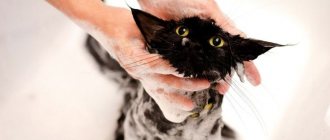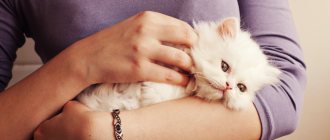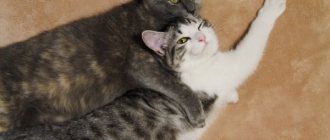Cats by nature are obstinate and independent creatures. They can bite and scratch, showing their instincts. In the article we will talk about the signs of cat aggression, the reasons why a domestic cat bites, and how an owner can understand readiness for an attack. In the material you will also learn how to wean an adult cat and kitten from biting and what not to do in the process of raising a pet.
Cats bite for different reasons and it's not always aggression.
The cat chews everything, what should I do?
You can also use a spray bottle of water, sprinkling it on the cat while biting.
This behavior is due to several reasons:
- Designation of your territory. Young cats imitate the behavior of adults in this way. This is instinct, this is how they mark their territory. In this case, weaning the cat from the addiction is relatively simple.
- Changing teeth. By chewing things, the cat satisfies the need to scratch its gums and relieve itching. A visit to the veterinarian will help eliminate this phenomenon. He will tell you what is best to feed your pet to help him.
- Need for attention. Having noticed that the cat is chewing things, you need to use gentle methods of education in relation to it, and caress it more. You should also monitor his well-being and contact a veterinarian if necessary.
How to stop a cat from chewing
To wean an animal from this habit, you should:
Options for how to wean
You can stop your cat from biting. It is important to adhere to a certain line of behavior.
Wean the kitten
Kittens, like children, need to be raised. And the sooner this process begins, the more effective it will be. It is more difficult to retrain an adult animal than a baby. If the kitten bites hard, you need to stop playing and clearly, loudly say “No” and stop interacting with it, ignore it for a while. You can hiss at him after a bite.
Another option is possible - to switch attention to something else, for example, a toy, but you cannot give a treat. Otherwise, he will take this as praise and will continue to behave aggressively towards people.
The easiest way to stop biting is at an early age.
Wean an adult cat
When the cat is already an adult, you can use several techniques that will help rid your pet of the habit of biting. These methods include:
- Proper communication between cat and guests. A cat should not perceive people as aggressors, so it is worth teaching him to communicate from a young age. It is also important that those who come behave with respect for the pet: do not pick him up if he doesn’t like it, don’t throw him up (he may get scared) and don’t bother him too much. If an animal has huddled in a corner in front of guests, there is no need to pull it out of its shelter to show off to your friends.
- The cat should have toys with which he can have fun, but you should not play with your hands.
The cat must have toys for “biting”
- When a cat bites, you need to make a sharp sound and he will let go, as it is unpleasant for him. You can clap your hands or shout sharply.
- If aggression in the form of biting occurs frequently, and all obvious reasons for this behavior have been excluded, you should visit a veterinarian; the problem may be that your pet is sick.
- You can show the cat that bites are unpleasant for the owner. Try ignoring requests for a treat or more play.
- If bites are very frequent, then you can prepare a container with a spray bottle and spray it on the cat in case of aggression. He will get scared and run away. This will wean him from such behavior.
- Among other things, it is necessary to regularly vaccinate against rabies. Your pet can become infected with this incurable disease and become dangerous to others. Therefore, you should not neglect regular visits to the veterinary clinic.
Your cat may be marking you
You already know that you belong to your cat - this is not something you can deny. This way, the cat can leave its scent on you, as if you were rubbing its chin and cheeks. Let this be a warning to all the other cats around - you are their own person, not a stranger!
Cats mark their territory in different ways. They have glands on their cheeks, paws and sides that they can use to rub against objects and other creatures. Friction against the legs indicates the shape of the markings.
This act is a great form of communication for our feline friends. So, if you put your cat in the nest and they rub or "hit" you and bite your nose, they are probably just letting you know that you belong to them. Who doesn't want to be a pet cat?
Eclampsia in a cat: what are the signs and what to do?
Eclampsia (aka milk fever) is provoked by hypocalcemia - a disorder of calcium metabolism in the body, in which it begins to be sorely lacking. Milk fever usually develops in the first 2–3 weeks after lambing. This is due to the active leaching of calcium from the blood, due to the fact that it is involved in the formation of milk. Most common in mothers with multiple births.
Behavioral signals of developing eclampsia:
- Increased excitability and anxiety or lethargy and complete apathy;
- Aggression accompanied by lack of recognition of offspring and owners;
- Refusal to sit with own kittens;
- Avoidance of droppings feeding and biting, leaving marks on their skins;
- Frequently moving babies from place to place.
Physical signs of milk fever:
- Pointed muzzle with stretched skin and exposed fangs;
- Rapid breathing;
- Pale mucous membranes;
- Movements become abrupt;
- The animal has difficulty rearranging its “stiff” hind legs due to muscle spasms;
- Convulsions (intensity depends on the severity of the disease);
- Increased body temperature;
- Shiver;
- The pet often falls on its side;
- Uncontrollable salivation appears.
In a cat with eclampsia, the temperature rises to +41 °C. Carbon dioxide accumulates in the body, making it difficult for the animal to breathe. The pH in the blood increases and the calcium level decreases.
Milk fever is not so much dangerous for others as it is for a sick pet. If help is not provided in time, death from hyperthermia - due to depressed breathing and brain damage - will occur 12 hours after the onset of the attack.
If your pet has an acute attack of eclampsia, call your veterinarian immediately. Sometimes time passes by minutes, especially when an attack is not detected immediately, the doctor may simply not have time. It is in this case that, while waiting for the doctor, you will need to provide first aid to your pet yourself.
In case of an acute attack of eclampsia, it is necessary to inject subcutaneously:
- Fospasim or any other sedative - 1 ml;
- Gamavit - 1 ml;
- Calcium borgluconate (heated to 39°) - 2-3 ml at intervals of 45 minutes until symptoms disappear;
- No-shpa - 0.3 ml;
- Prednisolone - 0.5 ml.
After injections, place the cat in a dark, noise-free room until the attack stops. To prevent relapse, calcium (1 ml) will need to be injected 2 times a day for about two more weeks.
As the disease progresses, the kittens are taken from the mother cat and fed with an artificial formula, then returned. If the babies are more than 3 weeks old, introduce complementary foods; formula alone will no longer be enough for them.
Certain cats are more prone to milk fever than others.
If your pet is predisposed to eclampsia - if such an attack has occurred at least once - it is necessary to pay special attention to her after lambing. In addition, you should worry about the issue of prevention in advance by consulting with a veterinarian.
As a rule, a diet with a high calcium content is prescribed. Cats at risk always have a fairly high chance of relapse. For such pets, the intervals between lambings should be as long as possible.
How to understand when to take up parenting
Signs of aggression in cats can manifest themselves in different ways. For example, the habit of suddenly throwing yourself to your feet. Sometimes the owners do not pay attention to this, but this is how the pet demonstrates that it is a dominant individual and has the right to establish its own rules.
Cats perceive the family they live in as a pack. Each member has a specific position in the hierarchy system. If the owners forgave the kitten all the pranks and did not educate him, as the animal grows older, it will occupy an increasingly higher position.
Kittens should not be allowed to grow up in permissiveness.
Disease
There are times when a pet suddenly begins to show excessive aggression both towards its own babies and towards its owners. It is not uncommon for cats to develop eclampsia after giving birth, and this can be a reason for sudden hostility.
Eclampsia is a disease that should only be diagnosed by a specialist. It is not recommended to make a diagnosis yourself, because the cause of aggressive behavior may be simple fatigue or pain in the mammary glands (mastopathy). And yet, given that this disease occurs quite often, let's talk about it in more detail.
Why does a cat bite its owner's legs and attack him?
Cute pets living in our homes can bring not only joy and benefit. Often, a cat is capable of angering its owner with its feline actions or habits. For example, if a cat constantly bites its owner's legs, then this behavior may begin to irritate him. It’s good if this happened once, but what should the owner do if the cat does this every day?
Why does a cat bite its owner's legs?
Why does a cat attack its legs?
Not all cat quirks can be tolerated. But in order to stop your pet from biting, you first need to understand why he behaves this way.
The cat jumps on your face and bites!
Of all the negative habits that cats have, face jumping is the most unpleasant. After all, it is also dangerous: cat claws not only leave scratches on the skin, but can also damage the eyes. Why does a cat behave this way, and the main question is: how to wean her from it?
Why does a cat bite your face?
We want to reassure you: a cat jumps on your face and bites not because it doesn’t love you or wants to offend you, but because that’s how it… plays.
Cats have lived side by side with humans for centuries, and we have already learned to understand them. However, some features of their behavior will forever remain a mystery to us. For example, we will never know why a cat lying peacefully nearby suddenly gets the idea to attack our face. But you don’t have to know – you have to wean her off!
How to stop a cat from jumping on your face and biting?
If a cat bites the face, even the most patient owner may not be able to stand it and slap her in the face. However, this measure will not bring the expected result, but will only spoil the relationship.
Brute physical force as punishment does not teach a cat, but turns it against its owner. In addition, your pet can be seriously injured. Everyone knows that children should not be hit on the head. But what about cats? Their heads are no less sensitive. The same applies to the back. A cat has a huge number of nerve endings in this area, and with a strong slap, it will feel the same thing as a person with a blow to the solar plexus.
Therefore, we categorically do not introduce brute physical force into the educational process. We replace it with symbolic force: a click on the nose or a slap with a kitchen towel. You will be surprised to learn how sensitive cats are to such measures.
The situation is similar with the voice. Screaming is a serious irritant for a cat. He scares, but again, he doesn’t teach. A clear and strict “don’t” will be much more beneficial.
So, your actions
when a cat bites your face:
Clearly and strictly command “No!”
Threaten with your finger or unleash heavy artillery: click on the nose, slap with a towel or spray with water from a spray bottle. One option to choose from!
Read more about the last point. Water is perhaps the worst punishment for most cats. Arm yourself with a spray bottle and spray water into your cat's face whenever she performs unwanted actions. A few “tortures” with water will be enough for the cat to behave in an exemplary manner at the sight of a spray bottle (even if it’s standing peacefully nearby).
And the most important rule of education. The cat must be punished at the time of the offense or immediately after it. Even a minute's delay will bring the education to naught: the cat will not understand why it was punished, because... simply will not be able to correlate the punishment with his action.
Buy special toys for your cat! The more a pet is busy with an exciting game, the less time and energy it will have to play “cat and mouse” with its owner!
When weaning your cat off its habit, it is important to be consistent. If yesterday you punished a cat for its misdeed, and then ignored it, there will be no result.
Don't forget that the best teachers are demanding, strict, but always friendly. Whatever misunderstandings there are between the owner and the pet, do not let them ruin the relationship between you, it’s not worth it!
Source
What causes furry friends to be aggressive?
If a previously affectionate cat suddenly begins to bite, and not only when you stroke her belly, but just like that, for example, on the legs of the owners who are just passing nearby, first of all you should find out the reason for this behavior. After all, if a cat purrs, caresses and at the same time tries to bite, then this is not a sign of aggression. Most often, this is how the animal shows that it loves its owner. But he does it in his own way, like a cat. You've probably noticed that they behave the same way with each other. Therefore, light bites should not be given too much importance.
Most often, domestic cats, according to experts, bite for the following reasons:
- Cats can suddenly change their behavior and start biting due to pain or the development of an internal disease. In this case, you need to seek help from a veterinarian as quickly as possible, especially if the owners notice that their pets are trying to hide in a secluded place. Aggression then manifests itself very clearly if members of the household try to remove their pet from the so-called shelter.
- Fear is another reason for aggression, but as soon as the cause of panic is eliminated, the pet will stop trying to bite or scratch its owner.
- An affectionate pet friend may become aggressive by scratching or biting the owner if the owner unintentionally causes him pain, for example:
- step on the tail;
- pinches his paw in the door;
- will handle the pet incorrectly, which will cause pain in the animal.
Final thoughts
Our cats can communicate with us in many ways. Once you get to know your feline friend better, you will be able to easily identify his behavior, which can sometimes be unusual. But if nose biting is a recurring event that is relatively recent, you may need help deciphering it.
As long as your cat isn't showing signs of aggression, nose biting probably won't be that big of a problem. However, if you feel that your cat is struggling to behave badly, consult your veterinarian.
Article Author: Ashley Bates Ashley Bates is a freelance writer and pet lover currently studying the art of animal therapy. A mother of four human children and 23 furry and feathered babies, Ashley volunteers at local shelters, advocates for animal welfare, and rescues every creature she finds. Her mission is to inform and educate about pets to prevent homelessness. Her specialty is cats and dogs.
Source
This is the closest point to pressing
Some cats bite and knead when they feel especially cute. They may bite because they feel frisky or simply out of boredom. If so, this may not cause you much concern. However, if they do it too hard, you should stop this behavior.
Your kitten may not understand how hard it is to be too hard. You need to set boundaries by letting them know that they can't bite your face at all. When your cat tries to bite your nose, firmly tell her “no” and keep some distance between the cat and your nose.
© shutterstock
Why do mother cats constantly carry their kittens in their teeth?
Mrrrr, my good ones! You know, I really love watching life on the street, and yesterday I saw a cat carrying her kitten somewhere in her teeth. And I felt a little sad.
After the fire in which my mother died, I myself lost the opportunity to bear and give birth to kittens. I envy healthy cats a little, but there’s nothing you can do about it. But to cheer myself up, I come to you. And today I will share my vision of why cats constantly carry kittens.
When kittens are born, the cat has a lot of worries about them. After all, any mother cat knows how much her babies need food and warmth, as well as her protection. So some inexperienced cats begin to carry their kittens. However, owners and the cats themselves often have different ideas about the safety and comfort of kittens. The owners, trying to make the place for the cat and kittens more comfortable and warm, purchase baskets, playpens, and arrange boxes, while the cat independently decides where it will be better for them. Having found a suitable place, in her opinion, the female begins to carry the kittens, clinging to their scruff with her teeth. In addition, there are cats that are overly preoccupied with their offspring, so they do not stop in one place and constantly drag their kittens around, finding more and more new places.
Before giving advice on arranging a place for a cat and her newborn kittens, it is necessary to understand why the cat drags kittens around?
1. The cat is not happy with the place. Sometimes the place chosen by the owners does not satisfy the cat's needs for comfort and protection. There may be several reasons for this:
- the place is very hot;
- the place is very cold;
- too many people near this place;
- too bright place.
2. The cat's inexperience in motherhood. It happens that a young mother cat, not understanding why the kittens squeak and not knowing what to do, begins to drag them.
3. Eclampsia. This is a very serious condition that can occur in cats in the first 4 weeks after birth. Causes of eclampsia in cats can be:
- deficiency, or vice versa, excess of calcium;
- poor nutrition during pregnancy;
- metabolic disease.
During illness, cats experience nervousness, aggressiveness, and heavy breathing. In addition, she begins to constantly grab and carry kittens from place to place. If symptoms of eclampsia are detected, you must immediately contact a veterinarian; ignoring the disease can lead to the death of the cat.
4. Breed specifics. Dragging kittens may also depend on the cat's breed. Some breeds have an instinct to protect their offspring from predators. For example, Bengal cats constantly carry kittens in order to hide them in more secluded places. In this way they throw predators off the scent.
Even during the cat’s pregnancy, it is necessary to find and prepare several secluded places so that the cat can independently choose the most comfortable place for her. Fence off those places in the house that, in your opinion, may threaten the safety of the cat and her kittens. In addition, the chosen location should not be noisy or crowded. Also, the cat does not accept a place that is too hot or too cold. Something like this might be suitable for a cozy place for a cat and kittens. And then - if she likes it. Something like this might be suitable for a cozy place for a cat and kittens. And then - if she likes it. The ideal place for a cat and her newborn kittens is where there is a warm floor, moderate lighting (preferably dark) and the absence of unnecessary furniture.
Under no circumstances should you forcibly take kittens and drag them to a more suitable place, in your opinion. This can have a negative impact on the psyche of a cat experiencing stress after giving birth. Finally, it is worth recalling that there is no need to interfere with the process of nature - the cat itself knows how to take care of the kittens. Therefore, peace and quiet is the best way to relieve her of such difficult worries about the kids. Of course, the only reason you need to intervene is if the cat is sick and you need to help her.
Click “Like” and receive only the best posts on Facebook ↓
Your cat is showing affection
Have you ever been petting your buddy and suddenly he grabs you and gently bites your hand? This action is a complete manifestation of affection. They reciprocate your feelings. You may be holding them and your nose is the closest they can come to reacting to.
If you've ever seen two cats interact with each other, you may have noticed this behavior during grooming. Two cats lying together may lick each other and then bite each other gently. This is a good sign. This means that they are completely relaxed, calm and ready for love.
The meaning of the cat's actions. Translation from cat language to human
If an animal bites or scratches you, it means that the animal is attached to you.
Gentle purring with squinting eyes, always only for the owner.
If a cat rolls from side to side and shows his belly, then he trusts you recklessly.
If a cat butts and pushes with its head, this expresses love for the person.
Trampling with paws on the owner’s body is complete trust.
Gifts brought for you: a strangled mouse or a caught bird - the cat adores you and is ready to give you everything.
If the cat lies down on its lap, the animal loves and trusts the person.
A long, squinting cat gaze can be interpreted as a declaration of love.
Presents his fluffy butt to the owner - demonstrates love and trust. (Kittens always turn their backs to their mother when they meet).
Meows at you - wants to talk or asks for food. A fluffy tail raised up is a joy from meeting you.
Biting hands - adoration. Cats mark things, sharpen their claws on furniture and wallpaper - they are comfortable and safe in the house. It is useless to scold or punish a cat for this, he does not understand why he is being scolded, he needs to be weaned differently.
Your cat is warning you
Maybe you're invading their space too much and don't even know it. If they want you to back off, they may bite your nose lightly and then hiss or growl. If your cat shows you that they need space, give them what they want. If you resist the situation, you may actually end up getting bitten or scratched!
Cats can't talk like we do, so if they're fed up with your antics, this is the only way they can communicate. But of course, no animal should bite out of aggression. The best thing to do in this case is to not put you or your kitten in this predicament again.
Remember that animals have boundaries too. Sometimes they are not in the mood to attract attention. Cats are big believers in consent. If they don't want to be domesticated right now, your best bet is to listen to their body language.
Frequently asked questions about cats
Often cat owners ask questions: why does their pet perform certain actions and what is the reason for this? Here are the answers to some of them.
Why doesn't my pet eat from a bowl, but drags pieces of food onto the floor?
The animal has very sensitive whiskers, and he does not like it when they come into contact with dishes. You can offer your pet a low, wide bowl or accept that he eats from the floor.
Why does an animal crouch when it notices a bird or a mouse?
The main goal of a hunter is to catch prey. To prevent the victim from noticing that they are about to attack her, the cat tries to behave as quietly as possible. She crouches to the ground, camouflages herself in the tall grass and prepares to jump. The muscles are tense, one jump must be enough for her, otherwise the prey will have time to escape.
Why does the mustachioed creature “interrupt” you when you are talking on the phone?
The pet simply does not understand that you are communicating with someone else. He does not see your interlocutor and therefore believes that since you paid attention to him, then you need to say something in response.
Why does a cat sharpen its claws on wallpaper and upholstered furniture?
Firstly, the cat needs to sharpen its claws, and secondly, there are glands between the toes that emit a special aroma. This is how a cat marks its territory.
Why does a sick animal want to hide in a dark corner?
This is due to natural instincts. Sick animals can become easy prey for larger predators. To avoid potential danger, the cat hides as far as possible.
Why does a cat lightly bite its owner?
This is how she shows her love.
Why does a pet love to lick its fur so much?
Because he is clean. But there is another reason - this is how a cat calms its nerves when something has thrown it off balance.
Why does an animal raise its upper lip when it smells something?
In the mouth of cats there is a special Jacobson's organ, which is responsible for the additional sense of smell. If your pet is interested in something, he will want to inhale the exciting aroma as deeply as possible.
Why doesn't the furry beauty like to swim?
Animals usually respond calmly to water, and some may even enjoy taking a bath. However, we must take into account that cats are very sensitive to their freedom. And when they are shoved into a basin or bathtub and forcibly soaped, this “causes outrage.”
If you pet a cat for too long, it may bite. Why?
Every cat has very sensitive areas. Mainly tail, mustache, nose, ears. When a person begins to show increased attention to them, the cat may be patient, but not for long. Then the animal makes it clear that it does not like this kind of treatment.
Why does my pet drink tap water?
Like most animals, cats prefer fresh water. Therefore, tap water attracts them much more than water poured into a bowl.
The cat hides its toys near the feeding area. Why is she doing this?
There are several places in your home that your cat considers his own. Favorite toys should be hidden where, in her opinion, no one will touch them. Encroachment on personal territory can greatly offend a pet.
The cat turns away if you don't pay attention to it for a long time. What is the reason?
The pet perfectly reads your body signals. As soon as you move out of his sight or stop paying attention to him, he loses interest in you and turns away.
The cat brings dead mice and moles to the doorstep. How can I wean her off this?
Perhaps the pet believes that you need to be fed, and gives its prey as a sign of love. Or hides the mouse for the future. Humble yourself and just throw away the “gift” every time it appears in your home. And of course, be proud of your talented hunter.
Why does a cat lick inedible things, such as plastic bags?
This is another way to “taste” smells.
The animal actively buries the food bowl and scratches the floor around it. Why?
Either your pet is trying to hide the food for later, or she is showing you that the food has spoiled or she simply doesn’t like it.
Why does a cat attack a person's legs and bite their heels?
This is due to the desire to hunt. At home, instinct is expressed in harmless play. If the kitten starts biting too hard, let him know that he shouldn't do that.
Why does a cat rub against furniture and legs?
It’s very simple: this is how she marks her personal territory so that a stranger does not encroach on it. At the base of the tail, near the whiskers and between the front paws there are glands, thanks to which the pet leaves its scent on what it considers its property.
Why does a pet “trample” its owner and things?
It has to do with instincts. In early childhood, kittens use similar movements to stimulate an abundant supply of milk. An adult cat expresses its love and satisfaction in this way.
Why does an animal go into the arms of those who don’t really love them?
If a person behaves calmly and does not grab the cat in his arms as soon as he sees it, then she believes that this is a sign of attention. A freedom-loving animal can choose as its idol a person who treats her more than coolly. When a cat comes up to you and lightly bumps its head against your legs, it is showing its love and affection.
Why does a cat lick a person's hair and face?
The love and devotion of a pet is a well-deserved reward for warmth and care.
It is a form of expression of devotion and care. In early childhood, the kitten receives similar signs of attention from its mother. For him, this is normal behavior, an expression of great love.
Your cat can groom you
We see cats grooming each other all the time. If you are "one of them", they will try to court you too. What they're really trying to do is teach you how to take care of yourself.
You may not know it, but your cat knows that she is smarter than you. That's why they try to teach you basic survival skills. Perhaps your cat left a mouse or bird on your porch. They think you're too stupid to hunt yourself, so they try to feed you.
Similar to this mood, your cat will groom you to teach you how to clean yourself - you are a dirty animal. If your cat bites your nose, it may be a routine cleaning. If it hurts, let them know and move on. Although this type of nose-biting likely won't do any harm.
Why does the cat bite my nose?
Our cats communicate with us in many different ways. Some ways are comedic, others are complex, and some are second nature and completely expected. But what if your cat has a strange quirk and the message is unclear?
If your cat bites your nose, you may be wondering what the hell is going on. But the reason for this behavior may actually be due to several factors. So, ask yourself - are they aggressive? Are they acting playful? Other body signals can point you in the right direction. Let's take a closer look at each cause—and how to stop it, if necessary.
Daddy cats
Fathers sometimes behave even more strangely than mothers. Experts are trying to understand what the problem is.
Fighting for the cat's attention. Cats understand that after giving birth a “woman” will be completely captivated by her offspring, so they try in every possible way to get rid of their rivals. After the death of the babies, the mother quickly resumes estrus and is again ready to mate
All the best for your children. This is clearly demonstrated by cats in nurseries, eating other people's cubs and making room in the sun for their own. The struggle for leadership. Just as cats determine the viability of kittens, cats clearly distinguish babies of their own sex. Destroy the leader, the leader - this is the goal of the dad cat. This is especially true in the case of pets.
After the death of the babies, the mother quickly resumes estrus and is again ready to mate. All the best for your children. This is clearly demonstrated by cats in nurseries, eating other people's cubs and making room in the sun for their own. The struggle for leadership. Just as cats determine the viability of kittens, cats clearly distinguish babies of their own sex. Destroy the leader, the leader - this is the goal of the dad cat. This is especially evident in the case of pets.
Cannibalism is characteristic not only of cats, but also of many other animals. Some of them regulate the population in this way, others demonstrate an example of natural selection. It looks wild with pets, so you can only prevent your pet’s inappropriate behavior by taking care of her before and during childbirth.
- How many kittens does a cat give birth to for the first time?
- Bleeding in a pregnant cat: what to do
- How does a cat behave after mating?
Why does the kitten bite?
All the characterological nuances of an adult cat are laid down in childhood, namely, in the type of relationship that the kitten maintained with its mother and its siblings. Kittens, like any other animal, have a need for security associated with their mother figure.
Satisfied need for security simplifies the kitten's further maturation
We are accustomed to not paying due attention to the development of the kitten’s psyche, which has led to gaps in knowledge about the roots of aggression in our furry pets. Knowing the conditions in which your pet grew up - especially the first months of life - will allow you to take a fresh look at your pet.
Understanding cat psychology
In an extremely generalized form, inappropriate behavior of a kitten can lie in 3 reasons:
- Psychological characteristics;
- Lack of socialization;
- Wrong upbringing.
Let's expand on these points in more detail:
- If your pet is separated from its mother cat too early, prepare for possible outbursts of aggression in the form of biting and scratching. Since the kitten has not had time to build a trusting relationship with its mother, it will act coldly or aggressively in its relationship with you. Attacking the owner in such situations will mean the pet is suspicious and trying to protect itself from your evil intentions. The fangs will act as self-defense. Unfortunately, this type of aggression is practically impossible to correct. The best thing you can do for your kitten is not to make him worry about his life. If your pet wants to keep a certain distance, keep the distance. This way you will calm the animal’s psyche and keep your skin intact;
- If for some reason the kitten did not have the opportunity to play enough with its peers, this will certainly affect its future behavior. The kitten inherits its habits from its predatory parents and from the first months of life manifests itself as a hunter. Since the kitten is not ready to get food at such a young age, it converts hunting behavior into play. The cute antics of kittens, when they climb on top of each other, claw and fuss, seem extremely harmless to us, but it is through play that young predators give free rein to their instincts. In the absence of such fun, play and hunting attitudes are mixed in the kitten’s behavior. Playfully, he can easily sink his fangs into an unsuspecting owner;
- If all of the above difficulties do not affect your pet, and he still tries to cling to you, most likely the problem is in his upbringing. The owners do not notice the instructions that they inadvertently give to the cat and are surprised when he begins to broadcast them. For example, a kitten can be very playful and active. In the absence of toys, he will often encroach on his master's feet. But since kitten bites are not particularly scary, the owner will prefer to turn a blind eye to this, instead of buying suitable toys for the pet. As a result, we have an established behavior pattern that will bring more and more discomfort to the owner as the kitten grows older. The owner himself is responsible for this scenario, and therefore all attempts to punish the animal will lead to an increase in misunderstanding and mutual bitterness.
Changing teeth
Cats, like other mammals, are characterized by a change of teeth from milk teeth to permanent teeth. Therefore, at a young age, when kittens feel discomfort from teething teeth, they feel a constant need to chew something. It is not at all surprising that this something could be the owner’s leg or hand.
The desire to bite everything that can be reached is a physiological need for kittens 4-5 months old
The person’s task is to provide the kitten with appropriate objects on which to sharpen its teeth without harming the enamel. Especially for such cases, there are silicone rings that allow kittens to scratch their gums painlessly.
If the owner has never encountered tooth loss in kittens, then unusual actions of pets, such as attempts to “fix” the jaw and frequent swallowing of saliva, can confuse him. To prevent this from happening, below we provide information about the time of teeth change and the characteristic signs accompanying this process.
Changing baby teeth in kittens
Sign of stress or illness
If a cat is feeling stressed or unwell, she may be prone to showing signs of aggression, including biting. Your pet may want to be given more personal space.
In rare cases, a cat may even experience a condition known as hyperesthesia, where it is extremely sensitive to touch. In cats with hyperesthesia, the follicles are even more sensitive than normal. You may notice that your cat gets goosebumps when you stroke her back.










